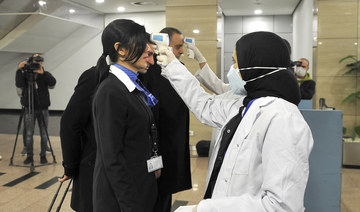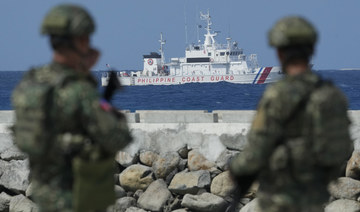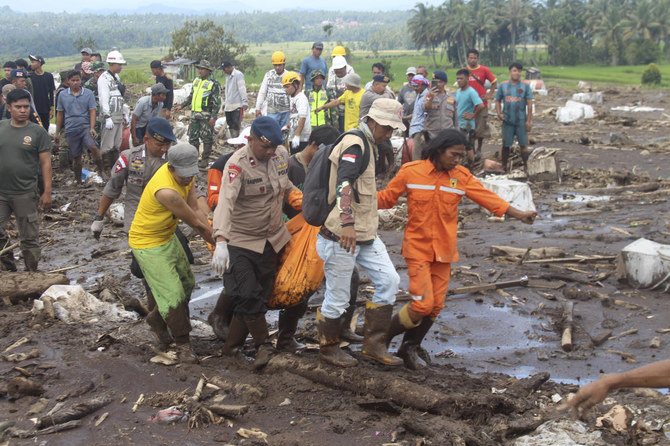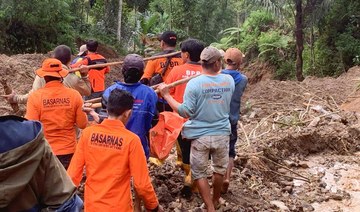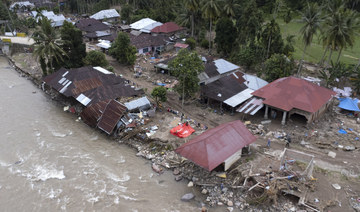BEIJING: China’s top leadership has admitted “shortcomings and difficulties” in its response to the coronavirus outbreak, as state media said a new hospital built at breakneck pace began receiving patients in the epicenter of the crisis.
Sixty-four new deaths were confirmed on Tuesday — surpassing Monday’s record to post the new biggest daily increase since the virus was detected late last year in the central city of Wuhan.
The death toll in China stood at 425, and at 427 globally, exceeding the 349 mainland fatalities from the Severe Acute Respiratory Syndrome (SARS) outbreak of 2002-03, which killed nearly 800 globally.
Meanwhile, Singapore on Tuesday announced the first local transmissions of the coronavirus.
The Ministry of Health said it had found six additional cases, four of them involving human-to-human transmission in Singapore, bringing the total infections to 24 in the city-state.
“Though four of these cases constitute a local transmission cluster, there is as yet no evidence of widespread sustained community transmission in Singapore,” the ministry said in a statement.
Hong Kong reported its first coronavirus death, local news broadcaster TVB said on Tuesday, the second fatality outside mainland China.
The 39-year-old male had previously been reported by local authorities as having an underlying illness. Hong Kong has had 15 confirmed cases including one that was transmitted locally.
The government in Beijing nevertheless hit out at the United States for sparking “panic” with its response to the coronavirus, including a ban on foreigners who have recently been to China.
Malaysian health authorities on Tuesday confirmed the first citizen to be infected with the new coronavirus, bringing the total number of confirmed cases in the country to 10.
They said the 41-year-old Malaysian had travelled to Singapore for a meeting last month with colleagues from China - including one from Wuhan, the epicentre of the epidemic. But he only showed symptoms on Jan. 29, nearly a week after he returned to Malaysia.
Health Minister Dzulkefly Ahmad said lab results on Feb. 3 confirmed that the man, along with a 63-year-old man from Wuhan who had been under observation, had contracted the virus.
A South Korean woman who recently visited Thailand was also confirmed Tuesday as having the coronavirus, Seoul’s health authorities said, bringing South Korea’s total number of patients to 16.
She is a 42-year-old Korean woman who returned to the country from Thailand on January 19, according to Seoul’s health authorities.
She started showing symptoms six days later, and was diagnosed with the virus on Tuesday, they added.
But the Korea Centers for Disease Control and Prevention said it was too early to conclude whether the patient contracted the virus while in Thailand, where 19 cases have been confirmed so far.
“We need detailed research through an epidemiological survey,” Jeong Eun-kyeong, director of KCDC, told reporters.
South Korea has so far seen at least four cases of human-to-human transmission of the virus, while a hospitalised Chinese tour guide is believed to have caught the illness while working in Japan.
A South Korean ban came into force Tuesday blocking entry to foreigners who have visited China’s Hubei province in the previous 14 days.
The virus has so far spread to more than 20 countries, and several other nations have instituted tough travel rules.
The World Health Organization has declared the crisis a global health emergency, and the first death outside China was confirmed in the Philippines on Sunday.
As it races to try to contain the spread of the virus, China’s elite Politburo Standing Committee called for improvements to the “national emergency management system” following “shortcoming and difficulties exposed in the response to the epidemic,” according to the official Xinhua news agency.
“It is necessary to strengthen market supervision, resolutely ban and severely crack down on illegal wildlife markets and trade,” the Politburo said in a meeting on Monday, Xinhua reported.
The government also said it “urgently” needed protective medical equipment such as surgical masks, protective suits, and safety goggles as it battles to control the outbreak.
Authorities in provinces that are home to more than 300 million people — including Guangdong, the country’s most populous in south China with 113 million people — have ordered everyone to wear masks in public.
But factories capable of producing around 20 million masks a day are only operating at 60-70 percent of capacity, industry department spokesman Tian Yulong said, adding that supply and demand remained in “tight equilibrium” as a result of the Lunar New Year break.
Tian said authorities were taking steps to bring in masks from Europe, Japan and the United States, while the foreign ministry said countries including South Korea, Japan, Kazakhstan and Hungary had donated medical supplies.
Most of the deaths have been in Wuhan and the rest of surrounding Hubei province, most of which has been under lockdown for almost two weeks.
With more than 20,400 confirmed infections, the mortality rate for the new coronavirus is much lower than the 9.6 percent rate for SARS.
In Wuhan, where the virus is believed to have jumped from animals at a market into humans, authorities have been racing to build two new hospitals to treat the infected.
The first of those — a 1,000-bed facility — “began to receive” patients Monday, the People’s Daily reported, just 10 days after construction began, but no details were offered about how many.
The second hospital is due to open later this week.
The virus is taking an increasing economic toll, shutting down businesses, curbing international travel and impacting production lines of major global brands.
The Shanghai stock market plunged almost eight percent on Monday on the first day of trading since the holiday as investors played catch-up with last week’s global retreat.
In Wuhan, which has been transformed from a bustling industrial hub into a near-ghost town, residents have been living in deep fear of catching the virus.
The city’s medical facilities have been overwhelmed, with Xinhua reporting that 68 medical teams of 8,300 staff had been sent to Hubei.
The emergence of the virus coincided with the Lunar New Year, when hundreds of millions travel across the country for family reunions.
Originally scheduled to end last Friday, the holiday was extended by three days to give authorities more time to deal with the crisis.
But some major cities — including Shanghai — extended it again, and many schools and universities have delayed the start of new terms.
Road, train and air traffic were all significantly down on Sunday, when hundreds of millions of people would have been expected to return to their cities of work, the transport ministry said.
Many companies offered staff the option to work from home or defer travel, or simply remained closed.
Many nations have evacuated hundreds of their citizens from China — with some forcing them into quarantine on their return — and more airlines are canceling services to the mainland.
China’s foreign ministry on Monday criticized the United States for being among the first to evacuate nationals without providing “substantial assistance” to China.
The US actions had caused “panic,” said spokeswoman Hua Chunying.
Mongolia, Russia and Nepal have closed their land borders, while semi-autonomous Hong Kong announced Monday it was closing all but two land crossings.
The Cruise Lines International Association, which represents some of the world’s largest operators, said vessels will deny boarding to passengers and crew who have recently traveled to China.







